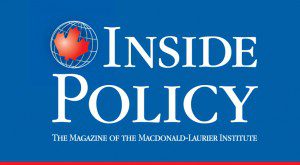 Lawrence Herman assesses the stability of the global multilateral trading system with the arrival of the Trump Presidency and Republican-controlled US Congress.
Lawrence Herman assesses the stability of the global multilateral trading system with the arrival of the Trump Presidency and Republican-controlled US Congress.
By Lawrence Herman, Jan. 16, 2017
“You’re going to pay a very large border tax.”
That’s what President-elect Trump said at his January 11 news conference (if it can be called that) about US companies that manufacture abroad, repeating statements he repeatedly made on the campaign trail.
It seems fair to predict this blustering will become actual US policy post January 20th. We’re seeing American trade policy being made through press conferences and 140-character tweets, creating huge uncertainty and unpredictability in international trade.
What Mr. Trump is saying – on its face – contravenes every US legal obligation under international treaties, especially the World Trade Organization (WTO) Agreement.
That Agreement contains sanctified rules that have been promoted and championed by every US administration since World War II – until now. Apparently, Mr. Trump has little regard for US legal obligations in ratified treaties.
We’ve gone from a reasonably orderly rules-based global trading system to one where there appears to be no rules as far as the incumbent president is concerned.
Think-tank analysis coming out of Washington seem to agree Trump could use executive authority to invoke one or another statute to proclaim so-called border taxes to penalize companies he doesn’t like.
One view is that this would directly challenge Congress’ constitutional authority over trade and the raising of revenue and could result in litigation in US courts until the cows came home.
Leaving aside the internal US legal situation, threats to apply penalty-type taxes on imports from China, Mexico, or other countries where US companies have manufacturing plants run counter to every known rule governing global trade.
First, there is the matter of bound duty rates, for 70 years under the General Agreement on Tarriffs and Trade (GATT) and now the WTO Agreement – and in all bilateral trade agreements the US has with others, Canada included. These are legal commitments. They can’t be unilaterally changed.
Bound duty rates make for stability in international commerce. These bindings are overlain with the fundamental rules of non-discrimination in international trade — Most-Favoured Nation (MFN) treatment plus national treatment.
This means imports must be treated equally in all respects with domestic-made goods in terms of taxes, charges, rules, and all other measures. WTO members have to provide equal competitive opportunities for imports in the local market.
The US has steadfastly promoted these fundamental rules since the Bretton Woods agreements of the 1940s. They ensure order and stability in international trade.
Without them, global trading system starts to fall apart and chaos results, the kind of situation that shook the global economy in the 1930s.
The US has invoked these same rules time and again in challenging discriminatory treatment by trading partners that affect American exports.
As well as Mr. Trump’s threat to apply border penalties, an equally dangerous proposal is being considered in the US Congress.
This involves changes to the US tax system, set out in a tax reform bill tabled by House Speaker Ryan and Congressman Kevin Brady, Chair of the House Ways and Means Committee, replacing the present 35 percent corporate income tax with a “cash flow business tax” of 20 percent.
The Ryan-Brady bill would then tax all imports, regardless of source, through a 20 percent border tax designed to equal the cash flow corporate tax.
Like Mr. Trump’s threat of 35 percent border penalties, the Ryan-Brady bill would set international trade back decades. As Canadian press analyses have said, the idea would be highly damaging to Canada-US trade relations and indeed global trade generally.
It’s true that GATT/WTO rules, formulated largely by the US itself, allow countries to apply border taxes adjustments to equate with internal sales taxes applied to like products.
Under these rules, border tax adjustments (BTAs) can be used to tax imports – in addition to import duties – but only at the same tax rate applied to domestic purchases of the same kinds of goods.
This means if a Canadian buys something through Amazon shipped from the US, HST is applied to the imported purchase – a legal BTA in accordance with GATT/WTO rules. It’s allowed because the same HST applies when the same good is bought in Canada.
The problem is the US doesn’t have an HST or a national value-added (VAT)-type tax. So they can’t use these GATT rules to apply a border tax because there isn’t any equivalent domestic tax.
The rules don’t allow border taxes on imported products to somehow adjust for corporate income taxes paid by domestic manufacturers. If every country did the same thing, the global trading system would unravel.
Both the president-elect’s threats of border penalties and the Ryan-Brady 20 percent tax proposals are thus cause for great concern. They have resulted in serious uncertainty about where international trade is heading.
If the American government ignores the obligations enshrined in international treaties, particularly the WTO agreement, that they themselves promoted and indeed formulated, the rules-based post-WWII multilateral trading system will soon start to crumble.
Maybe it has already.
Lawrence Herman is Associate Counsel at Cassels Brock LLP. During his career with the Foreign Service he represented Canada in numerous international conferences and meetings. He is former head of the Economic and Treaty Law Section in the External Affairs Department.




